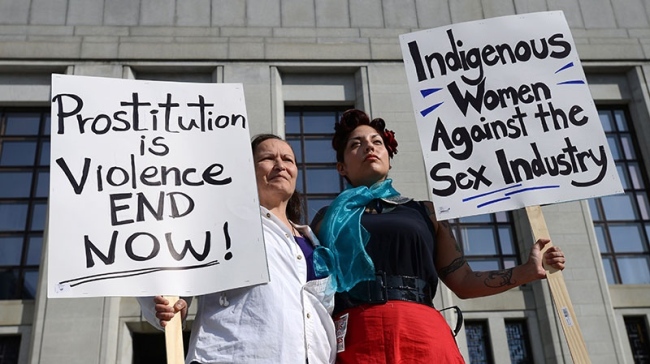legalization debate
Should Prostitution Be Legalized? : Debunking the Myths
In continuation of my last blog, Engaging in the Debate: Should Prostitution Be Legalized? I want to address some common misconceptions about the legalization of prostitution primarily highlighted by Joy Smith in her report, Tipping Point.
MYTH- Those opposed to the legalization of prostitution and in favour of abolition are moralists, religious or conservatives.
In many ways this myth couldn’t be further from the truth. Approaching prostitution from an abolitionist standpoint is cutting edge and progressive. Often countries like Canada herald nations such as Sweden for their standard of living and approaches to society. Sweden is the home of the abolitionist model in regards to prostitution. Joy Smith references a variety of organizations, which support the Canadian version of the Nordic Abolition Model including Canadian Association of Sexual Assault Centre’s, Native Women’s Association of Canada and Canadian Association of Elizabeth Fry Societies. Those in favour of abolition are not moralist, religious or conservative, they represent a group of people with an opinion based on research, experience and education.
MYTH – Legalization of Prostitution provides safety for sex workers.
Sex-industry lobby groups argue that prostitution should be a legitimate business – just made safer than it currently is. However, research from countries that have legalized prostitution (e.g. Germany, Australia, New Zealand, Holland) indicates that this has not worked.
- In 2013, German’s leading online paper Der Spiegel stated: “Germany has become a centre for sexual abuse of young women from Eastern Europe, and a playground for organized criminals from all over the world.”
- In Victoria, Australia, during 2003, police found in that legalization brought an increase in street prostitution as well as with high increases in the levels of violence and rape.
- In 2008, the Prostitution Law Review Committee in New Zealand found that the Prostitution Reform Act had not led to any significant improvement regarding employment conditions for sex workers.
MYTH – Legalization of Prostitution will prevent the prostitutes and brothels from going underground and being exploited.
Evidence suggests that this is not the case. The legalization of prostitution has not reduced underground brothels and women are still being exploited.
- In 2003, Major of Amsterdam, Job Cohen said that under the current Dutch legalization of prostitution, it was “impossible to create a safe and controllable zone for women that was not open to abuse by organized crime”.
- A 2002 estimate by the Victoria [in Australia] Police put the number of illegal brothels operating at 400, a number four times as large as the legal brothers.9
- A 2006 study by Canada’s Parliament found only 4% of prostitutes in the Netherlands registered after legalization due to stigma, leaving 96% underground and out of reach from police protection.
- A 2013 analysis examining the evidence heard by the Supreme Court of Canada in Bedford v. Canada documented the following evidence:
- 57% of women in legal brothels a Nevada study indicated they gave ‘part or all of their earnings to someone other than those controlling the legal brothel.’
- At least half the women in those brothels were ‘controlled by external pimps.’27
- Prostitutes within legal brothels were told they were ‘strictly forbidden to use condoms unless the customer asked for one…’
MYTH- Prostitution is the oldest profession and its not going to end.
Prostitution is not a profession; it is oppression. Think of apartheid in South Africa or any other human rights issues in history, what if people then had been happy to accept it as the norm:
“It is time to envision a society, and a world, without prostitution. This may sound idealistic, but the theory matters, the direction of travel matters, the aspiration matters; because if we can’t envision such a society, then we cannot even begin to build it…. Rather than simply throw our hands in the air and legalize the whole of the ‘sex-industry’, some genuine vision and ambition is needed here. It is time to choose which side we’re on, because the multibillion-dollar ‘sex-industry’ is doing fine and well, it does not need our support; it certainly does not need our protection. But around the world, exploited in prostitution, there are women, children and men who do, many of whom can see no end to their situation; so we must. We must make it happen; we must end one of the oldest human rights violations our world has known and relegate this blot on our humanity to history.” (Finn Mackay)
Unless otherwise indicated points have been taken from Joy Smith’s report ‘The Tipping Point‘ The purpose of this post is to summarize and discuss points in Smiths article to help inform the public. The intention is not to represent these views as my own original work or research. Picture from CTV.CA
The Canadian government is holding an online consultation between February 17th, 2014 to March 17, 2014 asking the public for their opinion on three international approaches: Decriminalization/legalization, Prohibition (criminalizes victim being sold), Abolition/Nordic Model. This is a critical time to take action! To take part in the consultation click here to be taken to the government consultation site.

